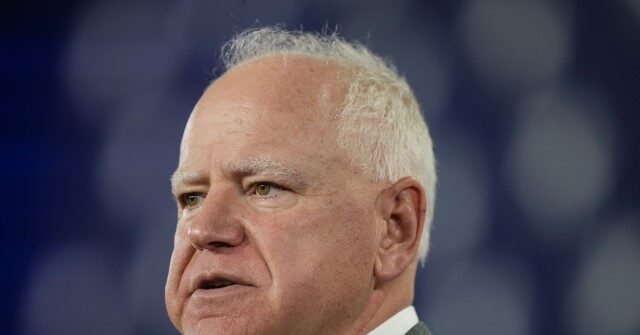Tim Walz, Kamala Harris’s running mate, has come under fire after revealing that his 90-year-old mother relies on her Social Security check to afford food. During a public address, he illustrated the financial dependency of his aging mother on social safety nets and criticized former President Donald Trump for being apathetic towards the plight of seniors. Walz’s mention of his mother’s reliance on Social Security raises a critical question: Why does a millionaire like him allow his aged mother to be financially dependent on government assistance? At the same time, this revelation highlights a disconnect between Walz’s wealth and the struggles of his mother, leading to discussions about the responsibilities of family members, especially those who are financially well-off.
Walz’s statements have sparked considerable criticism, particularly regarding his apparent lack of self-awareness. He previously boasted about his teaching experience at the 2024 Democratic National Convention, claiming that none of his 24 students ever gained admission to Yale. This comment prompted a negative reaction, suggesting that rather than seeing it as a failure in his professional responsibility, he perceived it as a point of pride. Such remarks paint a troubling picture of a politician out of touch with real-life consequences, including the well-being of his family members. Calling into question a significant ethical principle, the dichotomy between his financial status and his mother’s need for support is revealing of broader societal issues regarding wealth distribution and familial responsibilities.
The depiction of Walz’s situation provokes deeper reflections on the expectations individuals should have when it comes to caring for their parents in old age. For many, providing for one’s aging parents is not just a responsibility but a privilege. The notion that affluent individuals may not fulfill this role creates disillusionment regarding the concept of familial duty and societal norms. Critics argue that caring for parents is an important moral obligation, yet Walz’s actions—and his unwitting claim that his mother’s Social Security is integral to her sustenance—signals a shift away from traditional values that prioritize family assistance in times of need.
Those who resonate with self-defined moral codes might find it bewildering to see Walz’s financial success juxtaposed with his mother’s need for public aid. Caring for one’s parents, especially during their later years, is often perceived as a given, an ethical expectation rooted in love and concern. The dissonance presented in Walz’s narrative—a successful man allowing his mother to struggle—invites critique and reflection on the societal indulgence shown toward wealthy individuals who fail to live up to their family obligations. This disparity becomes a spotlight on the broader conversation about wealth, privilege, and moral responsibility.
In addition to the questions it raises about familial obligations, Walz’s remarks serve to articulate a gap between wealth and reality for many Americans. Wealthy individuals often become entangled in systems of entitlement that blur the lines of empathy and self-awareness. For instance, Walz’s story represents more than just personal choices; it encapsulates the systemic issues that force aging individuals to rely on Social Security for basic needs. His situation becomes emblematic of a nation grappling with the inadequacies of its safety nets while simultaneously housing individuals whose wealth could easily alleviate such struggles.
Finally, the portrayal of Walz’s situation resonates with many who feel that our society is failing to support its most vulnerable members adequately. The fact that his mother must rely on Social Security, despite having a wealthy son, creates a paradox that paints a grim landscape. The societal expectation for wealthy individuals like Walz to provide for their family can be construed as a reflection of larger societal failures in addressing elderly care, financial security, and the responsibilities of the affluent. It serves as a poignant reminder of the need for greater empathy, responsibility, and a re-evaluation of how society perceives the balance between wealth, family duty, and societal support systems.

